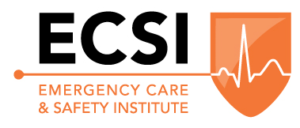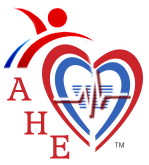Click the title of the course you are interested to find out more about it.

BLS from AHA offers the advantages of: Content representing the latest resuscitation science for improved patient outcomes. Realistic scenarios, simulations, and animations depicting rescuers, teams, and patients. Course and content flexibility for AHA Instructors and students, including adaptability to local protocols.
WHO SHOULD TAKE THE COURSE?
Healthcare professionals and other personnel who need to know how to perform CPR and other basic cardiovascular life support skills in a wide variety of in-facility and prehospital settings.
COURSE COVERS
• New science and education from the 2015 AHA Guidelines Update for CPR and ECC
• The components of high-quality CPR for adults, children, and infants
• The AHA Chain of Survival for prehospital and in-facility providers
• Important early use of an AED
• Effective ventilations using a barrier device
• Importance of teams in multirescuer resuscitation and performance as an effective team member during multirescuer CPR
• Relief of foreign-body airway obstruction (choking) for adults and infants
This is an instructor led class that contains both the cognitive portion of training and the psychomotor component of thorough skills practice and testing in a classroom setting.
Student receive a digital course completion card.
This advanced course, designed for healthcare professionals highlights the importance of high-performance team dynamics and communication, systems of care, recognition and intervention of cardiopulmonary arrest, immediate post-cardiac arrest, acute dysrhythmia, stroke, and acute coronary syndromes (ACS).
WHO SHOULD TAKE THE COURSE?
Healthcare professionals who either direct or participate in the management of cardiopulmonary arrest or other cardiovascular emergencies. This includes personnel in emergency response, emergency medicine, intensive care, and critical care units such as physicians, nurses, and paramedics.
COURSE COVERS
• Basic life support skills, including effective chest compressions, use
of a bag-mask device, and use of an AED
• Recognition and early management of respiratory and cardiac arrest
• Recognition and early management of peri-arrest conditions such as
symptomatic bradycardia
• Airway management
• Related pharmacology
• Management of ACS and stroke
• Effective communication as a member and leader of a resuscitation team
In the AHA’s advanced pediatric course, students learn how to use a systematic approach to quickly assess, identify the underlying cause, and treat pediatric patients in emergency situations. Students interact with real pediatric patient cases, realistic simulations, and animations to assess and treat these pediatric patients. This includes applying basic life support, following PALS treatment algorithms, and practicing effective resuscitation skills and team dynamics. Through a combination of cognitive learning and psychomotor skills practice, the PALS Course improves students’ confidence and skill levels for delivering effective emergency pediatric care.
WHO SHOULD TAKE THE COURSE?
Healthcare providers who either direct or participate in the management of respiratory and/or cardiovascular emergencies and cardiopulmonary arrest in pediatric patients. This includes personnel in emergency response, emergency medicine, intensive care and critical care units such as physicians, physician assistants, nurses, nurse practitioners, respiratory therapists, pharmacists and paramedics.
COURSE COVERS
• The systematic approach to assess and treat a seriously ill or injured infant/child
• Recognition and management of cardiac arrest
• Basic child and infant life support skills
• Effective resuscitation team dynamics
• Recognition and management of respiratory distress and failure, including airway management
• Recognition and management of shock, including vascular access
• Recognition and management of arrhythmias, including electrical therapy
• Post-cardiac arrest care

This CPR/AED with First Aid Course covers all of the topics from the NSC First Aid, CPR & AED course to meet the special needs of infants and children in our NSC Pediatric First Aid, CPR & AED course.
You’ll gain the hands-on training and confidence to respond in a variety of pediatric emergencies. The National Safety Council Pediatric Program meets the First Aid and CPR requirements for all 50 states and meets the latest CPR and ECC guidelines.
Participants will learn how to:
- Take action in a medical emergency
- Provide basic life support
- Treat bleeding and wound care
- Treat shock, burns and poisoning and deal with sudden illness
- Respond in cold and heat emergencies
- Ensure safety for children with disabilities
Who Should take the course?
- Child care providers
- Early childhood educators
- Youth organizations
- Parents and grandparents
- Individuals requiring certification
This First Aid Course covers all of the topics from the NSC First Aid, course to meet the special needs of infants and children.
You’ll gain the hands-on training and confidence to respond in a variety of pediatric emergencies. The National Safety Council Pediatric Program meets the First Aid requirement.
Pediatric scenarios are included in the course.
Who Should take the course?
- Child care providers
- Early childhood educators
- Youth organizations
- Parents and grandparents
- Individuals requiring certification

ASHI’s CPR and AED training course is designed specifically for laypeople, and is an excellent choice for CPR and defibrillator training in both community and workplace settings. This program will helps to prepare individuals to respond to sudden cardiac arrest (SCA) and choking incidents. This CPR and AED course conforms to the 2015 AHA Guidelines Update for CPR and ECC.
Who should take the course?
Individuals who are not healthcare providers or professional rescuers but who desire, or are required, to be certified in CPR and the use of an AED:
- Emergency response teams in business and industry
- Adult residential care personnel
- Teachers
- Parents
- Babysitters
The ASHI Basic First Aid course helps students develop basic first aid knowledge, skills, and the confidence to respond. This first aid training program is an excellent choice for both the community and workplace setting, and conforms to the 2015 AHA and ARC Guidelines Update for First Aid.
Who Should take the course?
Intended for individuals who are not healthcare providers or professional rescuers but desire, or are required, to be certified in basic emergency medical care.
Participants will learn:
- Legal and ethical principles of Emergency care
- Principles of assessment
- Caring for medical emergencies
- Soft tissue injuries
- Muscle and bone injuries
- Oxygen therapy
- Airway adjuncts
- Bleeding and wound care
- Shock
- Burns
- Sudden illness
- Hot and cold emergencies
- and more…
The ASHI Advanced First Aid course is designed for the person who needs or desires more first aid training than Basic First Aid, but not to the level of Emergency Medical Response. Perfect for corporate emergency response teams, this 17-21 hour Advanced First Aid certification course presents many of the most common illnesses and injuries responders are likely to encounter.
Prerequisites
Current, valid professional-level BLS certification (Basic Life Support). May be incorporated/conducted in conjunction with the AFA program as needed.
WHO SHOULD TAKE THE COURSE?
This Advanced First Aid training course is designed for non-EMS responders including government, corporate, industry, lifeguards, security personnel, law enforcement, corrections personnel, and other individuals who are not EMS or healthcare providers, but desire or require certification in Advanced First Aid.

ECSI CPR/AED training course is designed specifically for laypeople, and is an excellent choice for CPR and defibrillator training in both community and workplace settings. The course conforms to the 2015 AHA Guidelines Update for CPR and ECC.
Who should take the course?
Individuals who are not healthcare providers or professional rescuers but who desire, or are required, to be certified in CPR and the use of an AED.
Students receive a digital course completion card.
The ECSI First Aid course helps students develop basic first aid knowledge, skills, and the confidence to respond. This first aid training program is for both the community and workplace setting.
Who Should take the course?
Intended for individuals who are not healthcare providers or professional rescuers but need to be certified in first aid.
Students receive a digital course completion card
Participants will learn:
- Principles of assessment
- Caring for medical emergencies
- Soft tissue injuries
- Muscle and bone injuries
- Bleeding and wound care
- Shock
- Burns
- Sudden illness
- Allergic reactions
- Hot and cold emergencies
- and more…
WHO SHOULD TAKE THE COURSE?
New York state coaches who need this first aid version especially designed to meet the requirements for NY state coaches who work with students.
